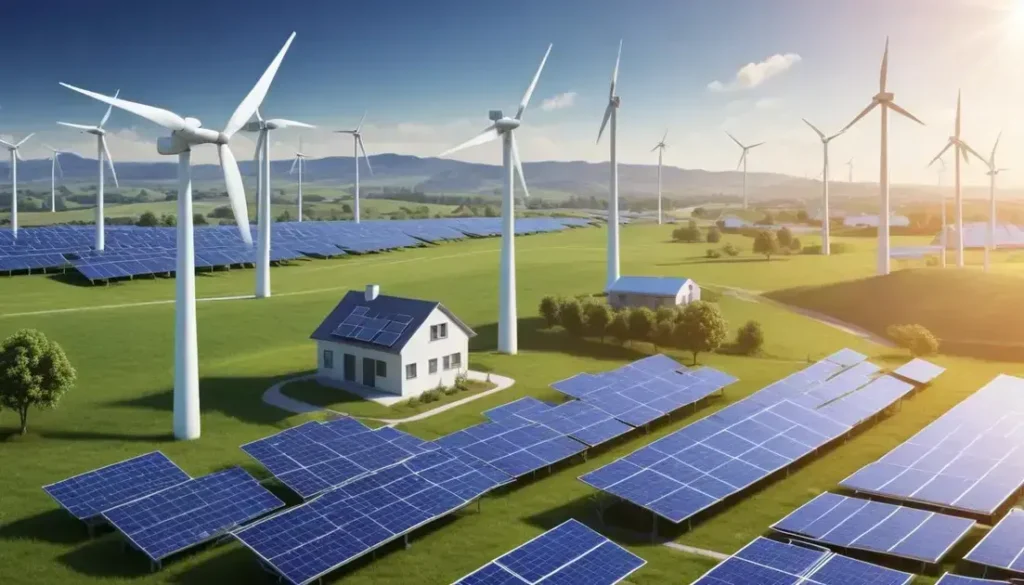Renewable energy procurement involves strategically acquiring energy from sustainable sources while addressing financing options, tax implications, and risks, allowing businesses to enhance sustainability and meet regulatory requirements.
In today’s changing energy landscape, **renewable energy procurement** is not just a checkbox but a strategic necessity for businesses. What should UK firms know to navigate these challenges?
Understanding the demand for renewable energy
A growing awareness of climate change and its impacts has significantly increased the demand for renewable energy across the globe. Businesses are recognising the need to transition to more sustainable energy sources to reduce their carbon footprint. This shift not only supports environmental goals but also aligns with evolving consumer preferences that favour green practices.
Companies are now investing in technologies such as solar and wind energy, viewing them as viable alternatives to fossil fuels. The transition often begins with assessing current energy consumption patterns and identifying opportunities for integration of renewable sources. By doing so, firms can enhance their energy resilience and achieve long-term operational cost savings.
Moreover, regulatory frameworks are becoming more supportive of renewable energy initiatives. Government incentives, such as tax credits and grants, play a crucial role in fostering this transition, making it financially more viable for businesses. As firms take action, many find that early investments in renewable energy yield competitive advantages in an increasingly eco-conscious marketplace.
Funding mechanisms supporting the transition
Funding mechanisms play a vital role in supporting the transition to renewable energy. Businesses often face challenges in financing the shift from traditional energy sources to greener alternatives. However, various financial solutions are available to facilitate this process.
One significant avenue for funding is through government grants. Many countries offer financial incentives to encourage companies to invest in renewable energy technologies. These grants can significantly reduce the initial capital required, making it easier for firms to adopt sustainable practices.
Additionally, green bonds have emerged as an innovative financing tool. These bonds allow companies to raise funds specifically for environmentally friendly projects. By investing in green bonds, businesses not only secure financing but also demonstrate their commitment to sustainability, appealing to environmentally conscious investors.
Moreover, private equity firms and venture capitalists are increasingly targeting renewable energy projects. Their investments can provide both the necessary capital and the expertise to drive innovative solutions. This influx of funding supports the development of cutting-edge technologies that enhance energy efficiency and sustainability.
The role of Virtual Power Purchase Agreements
Virtual Power Purchase Agreements (VPPAs) are becoming an essential tool for companies looking to engage in the renewable energy market. These agreements allow businesses to purchase energy from renewable sources without the necessity of a direct physical connection to the generation site. This flexibility is particularly beneficial for firms seeking to enhance their sustainability credentials.
With VPPAs, companies can secure long-term contracts to buy energy at a fixed price, providing financial stability and predictability. This structure also enables organisations to offset their carbon emissions by supporting renewable projects, further solidifying their commitment to sustainability. The result is a win-win scenario where both businesses and energy producers benefit.
In addition, VPPAs facilitate market access for renewable energy developers, allowing them to finance new projects more efficiently. Companies entering into these agreements can also lock in competitive rates for energy, making it an attractive option in fluctuating energy markets.
Moreover, the integration of VPPAs encourages innovation in energy solutions. As more companies participate, it drives advancements in technology and infrastructure that support the transition to a cleaner energy future. In this context, VPPAs are not only beneficial for individual companies but also contribute to broader environmental goals.
Assessing risks in procurement pathways
When embarking on the journey of renewable energy procurement, it is crucial to consider the risks associated with various procurement pathways. Each approach, whether direct purchasing or through intermediaries, presents unique challenges that can impact business operations.
One of the primary risks involves price volatility. Energy markets can fluctuate due to factors such as supply chain disruptions and regulatory changes. Companies must carefully assess their exposure to these fluctuations and consider strategies such as fixed price contracts to mitigate potential losses.
Another significant risk is related to contractual obligations. Companies must ensure that agreements with energy suppliers are clear and comprehensive to avoid hidden liabilities. Vetting potential suppliers thoroughly and understanding the terms of procurement can prevent costly misunderstandings.
Additionally, companies should be wary of regulatory risks. Changes in government policies or incentives can affect the viability of certain procurement options. Staying informed about the regulatory landscape is essential for making informed decisions and ensuring compliance.
Lastly, technological risks should not be overlooked. As renewable technology evolves, maintaining an up-to-date understanding of available solutions is vital. This awareness can help businesses choose the most effective procurement path that aligns with their sustainability goals.
Navigating tax implications for procurement
Navigating tax implications for renewable energy procurement is crucial for businesses aiming to maximise benefits while minimising liabilities. Understanding the tax landscape can significantly impact the financial viability of energy projects.
One of the most critical factors is the availability of tax incentives. Governments often provide various benefits to encourage investment in renewable technologies. These can include tax credits, grants, and accelerated depreciation on renewable energy assets. Companies must stay informed about available incentives to optimise their procurement strategies.
Moreover, it is essential to consider the impact of sales and use tax on the purchase of renewable energy systems. Depending on the jurisdiction, these taxes may vary and can significantly affect upfront costs. Businesses should evaluate these financial implications and factor them into their procurement budgets.
Additionally, companies must be aware of the ongoing compliance requirements related to renewable energy tax policies. This includes keeping accurate records and understanding reporting obligations to ensure compliance and avoid potential penalties.
In conclusion, careful planning and a thorough understanding of tax implications are vital for businesses engaging in renewable energy procurement. By proactively addressing these issues, firms can leverage financial advantages and support their sustainability goals.
In summary, navigating renewable energy procurement requires careful consideration
Businesses can gain significant advantages by understanding and addressing the associated risks, funding mechanisms, and tax implications. By taking strategic steps, companies can enhance their sustainability efforts while also ensuring financial viability.
As the demand for renewable energy continues to grow, staying informed about the evolving landscape is essential. This knowledge empowers businesses to make informed procurement decisions, thus supporting their long-term goals.
The journey towards renewable energy is not just about compliance; it’s about leading the way in sustainability and innovation. Embracing these strategies will position businesses strongly for future success.
Frequently Asked Questions
What are Virtual Power Purchase Agreements (VPPAs)?
VPPAs are contracts that allow businesses to buy renewable energy through financial agreements, without the need for a physical connection to energy facilities.
How can companies assess the risks in renewable energy procurement?
Companies can evaluate risks by analyzing price volatility, contractual obligations, regulatory changes, and technological advancements involved in procurement pathways.
What funding options are available for renewable energy projects?
Various funding options include government grants, green bonds, and investments from private equity firms, all aimed at supporting renewable energy initiatives.
What tax incentives exist for investing in renewable energy?
Governments often provide tax credits, grants, and accelerated depreciation for renewable energy investments, helping to reduce overall costs for businesses.
How can businesses navigate the impact of tax implications on procurement?
Businesses should stay informed about relevant tax incentives and compliance requirements, ensuring they optimize the financial benefits from their renewable energy projects.
Why is understanding the demand for renewable energy important for businesses?
Understanding demand allows businesses to align their operations with sustainable practices, enhancing their brand reputation and meeting consumer preferences.


